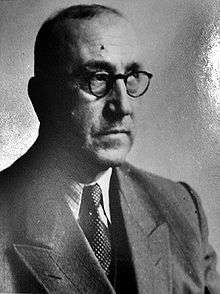Kimon Georgiev
Kimon Georgiev Stoyanov (Bulgarian: Кимон Георгиев Стоянов; August 11, 1882 – September 28, 1969) was a Bulgarian general who was the Prime Minister of Bulgaria from 1934 to 1935 and again from 1944 to 1946.
Kimon Georgiev | |
|---|---|
Кимон Георгиев | |
 | |
| 24th Prime Minister of Bulgaria | |
| In office 19 May 1934 – 22 January 1935 | |
| Monarch | Boris III |
| Preceded by | Nikola Mushanov |
| Succeeded by | Pencho Zlatev |
| In office 9 September 1944 – 22 November 1946 | |
| Monarch | Simeon II (1944-1946) |
| President | Vasil Kolarov (1946) |
| Preceded by | Konstantin Muraviev |
| Succeeded by | Georgi Dimitrov |
| Personal details | |
| Born | 11 August 1882 Pazardzhik, Eastern Rumelia (today Bulgaria) |
| Died | 28 September 1969 (aged 87) Sofia, Bulgaria |
| Nationality | Bulgarian |
| Political party | People's Alliance, Democratic Alliance, Zveno, Fatherland Front |
| Spouse(s) | Veska Rodeva |
| Children | Maria Georgieva, Kornelia Georgieva |
| Military service | |
| Branch/service | Bulgarian Army |
| Years of service | 1902–1935 |
| Rank | Colonel General |
Life and career
Born in Pazardzhik, Georgiev graduated from the Sofia military academy in 1902. He participated in the Balkan Wars as a company commander and in the First World War as a commander of a battalion. In 1916 he lost an eye due to injuries received in action. He left the army in 1920 with the rank of lieutenant colonel.
Georgiev was one of the founders of the Military Union in 1919 and the People's Alliance in 1922. He participated in the organization of the 1923 coup d'état and after that became one of the leaders of the Democratic Alliance. He was the minister for railways, postal service and telegraphs in the first cabinet of Andrey Lyapchev.
In the 1930s he became one of the leaders of the right-wing military Zveno ('Link') movement. Together with fellow officers he committed a coup d'état in May 1934 and became prime minister. He was also justice minister and for a short time minister of war and foreign affairs. He abolished all political parties and trade unions. Influenced by the Italian dictator Benito Mussolini, he introduced a corporative economic system (corporatism). In 1935 Tsar Boris III forced him to resign. During World War II, when Bulgaria was fighting on the side of the Axis, he grew close to the left-wing forces in Bulgaria and in 1943 he joined the anti-Axis Fatherland Front (FF) as one of its leaders. In September 1944 the FF committed a coup d'état and Georgiev again became prime minister. In 1946 he was succeeded by the communist leader Georgi Dimitrov and became vice-premier and Foreign Minister. Though Zveno was disbanded in 1949, Georgiev continued holding ministerial posts in each cabinet until 1962. From 1962 until his death in 1969 he was a member of the Parliament's presidium. Georgiev was twice awarded the title Hero of Socialist Labour.
He is known as stariya prevratadzhiya (стария превратаджия, in English, the old coup-maker) in Bulgaria for having organised three coups: 1923, 1934 and 1944.
References
Tasho Tashev, The Ministers of Bulgaria 1879-1999, Sofia, AI "Prof. Marin Drinov"/Publishing house of the Ministry of defense, 1999, ISBN 978-954-430-603-8 / ISBN 978-954-509-191-9 (in Bulgarian)
External links
| Political offices | ||
|---|---|---|
| Preceded by Nikola Mushanov |
Prime Minister of Bulgaria 1934–1935 |
Succeeded by Pencho Zlatev |
| Preceded by Konstantin Muraviev |
Prime Minister of Bulgaria 1944–1946 |
Succeeded by Georgi Dimitrov |